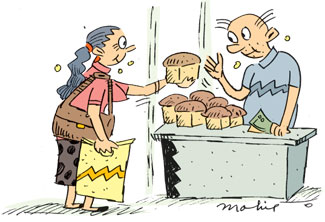|

by R. S. Karunaratne
How to use 'actual'
and 'actually'
Both words 'actual' and 'actually' refer to whether something is true
or factual.
Our vehicle broke down in a remote village and we spent the night in
a small house. It was actually a hut.
|

Well, what were you doing actually after leaving school?
|
Do you know the actual procedure of getting into a foreign
university?
Her father is actually a cook in a small hotel, and she brought food
for all of us.
'Actual' means 'true, real' or 'precise'.
His actual involvement in the newspaper editorial is almost
negligible.
'In actual fact ' is used for emphasis.
In actual fact, the recent floods are similar to the tsunami disaster
in 2004.
'Actually' is also used for emphasis when you refer to something
which is in sharp contrast to expectations.
The robber actually admitted his involvement in the robbery.
He was actually more popular as a pop singer than a classical
musician.
'Actually' often implies a contrast between a desirable and an
undesirable situation.
The seminar actually offered practical solutions to domestic
problems. (This suggests that other seminars do not offer practical
solutions to domestic problems).
'Actually' is used as a discourse marker in spoken English. For
instance, it is useful when you wish to signal a topic opening.
Customer: Can you refer me to the section where you keep books on
psychology? Actually, I'm looking for a dictionary of psychology.
Interviewer: Well, what were you doing actually after leaving school?
Interviewee: I worked as a trainee chef.
|

The robber actually admitted his involvement
in the robbery. |
In spoken English actually can be used in end position, although it
can be used even at the beginning.
A: What are you interested in studying?
B: I'd be quite interested in astronomy actually.
'The actual' introduces the main part of what you are going to
describe.
The programme starts at 6.30 p.m. but the actual film begins at 7
p.m.
'Actualities' refer to something real. Now he must be experiencing
the grim actualities of prison life.'Actually' is much more common in
spoken English than in written English.
A: Have you ever met Sonia?
B: I actually met her in Delhi.
'Actually' can be used in spoken English to soften what you say.
I don't want your opinion on this matter, actually.
Current
English usage
The English language is a living organism which is subject to change
from time to time. Be familiar with the following words, phrases and
clauses used in English.
1. Dual and duel
Dual is an adjective meaning 'double' or 'twofold.'
Anoma played a dual role in the party as organiser and secretary.
Duel is a noun meaning a formal fight between, two people. For a dual,
people usually use swords or pistols.
The soldier challenged a major for a duel.
2. Due to, owing to , because of
Use due to adjectivally.
His poor memory is due to head injuries sustained in a car crash.
When a prepositional use is required, use owing to or because of .
The company had to close down owing to mismanagement.
The schools were closed because of the floods.
3. Dyeing and dying
'Dyeing' comes from 'dye'
He was dyeing white clothes black.
My grandfather used to dye his hair.
'Dying' comes from 'die;'.
People were dying from starvation.
The dying man wanted to talk.
4. Each
Each is usually followed by a singular verb.
Each girl brought her own breakfast.
In order to avoid sexism in language, some people advocate the use of
a plural pronoun:
Each student brought his own writing instruments. People who dislike
this method use his/her combination. Each student brought his/her own
writing instruments.
However, his/her device is found to be clumsy. When each follows a
plural noun or pronoun, the verb should be plural.
The houses each have a wide floor area.
5. Each other and one another
Use each other when only two people are involved and one another when
more than two people are involved.
The two sisters love each other.
All her children love one another.
In modern English, this restriction is often ignored.
Economic and economical
Although both words come from 'economy', they have different
meanings. The government's economic policies are popular with the
people, Economical means 'thrifty'.
It is more economical to travel by train than by car.
Starters :
Use of articles with
countable and
uncountable nouns
Nouns that can be counted are countable nouns.
Nouns that cannot be counted are uncountable nouns. We use the
articles 'a' or 'an' only before countable nouns.
Countable nouns:
|

Mother bought a loaf of bread. |
Mother is making a cake.
John is going to buy a drum.
Sheela wants to buy a lawnmower.
A leaf fell from the tree.
Uncountable nouns:
Do you eat bread for breakfast?
We need machinery to run this factory.
We received a lot of rain during the past few days.
You need a racket to play tennis.
We can use the articles 'a' or 'an' with uncountable nouns in this
way.
The customer ordered a cup of tea.
Mother bought a loaf of bread.
We use the definite article 'the' with uncountable nouns when it is
clear to the listner or reader which things we are referring to. Do not
use 'the' with uncountable nouns when we are talking in general.
The rice imported from China is cheap.
Rice is the staple food of Sri Lankans.
Activity
Fill in the blanks with suitable articles. Check you answers with the
key.
1. She can jog for ...... hour.
2. We can have ...... meeting at 11. a.m.
3. Leela lives on ..... second floor.
4. ...... chef cooked ..... new dish.
5. ...... sky is blue and ..... sun is bright.
6. I saw ........ lady who was very beautiful.
7. Father carries ..... umbrella wherever he goes.
8. Ken is ...... union member.
9. ........ university student met with an accident.
10. Anita went to ........ well to fetch ..... pail of water. |

